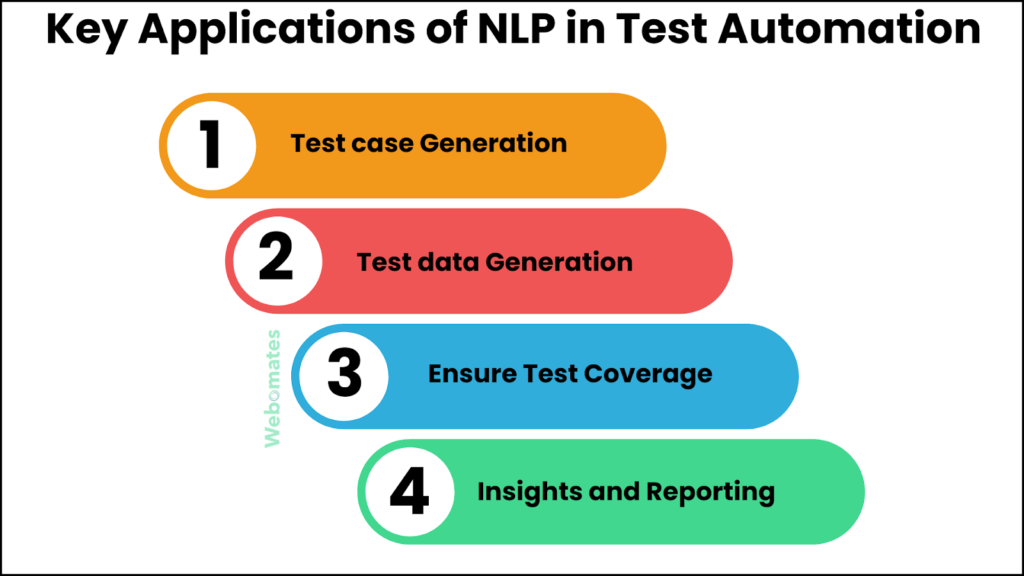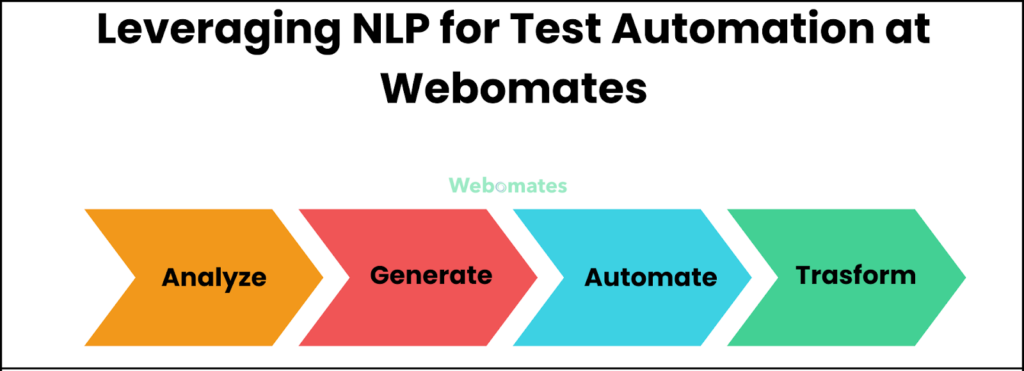Accelerate Success with AI-Powered Test Automation – Smarter, Faster, Flawless
Start free trialUnlocking New Value with NLP
Humans learnt to “code”. And now, we are training machines to understand and generate human language. It’s like teaching machines to speak our “codeless” language.
Natural Language Processing (NLP) is the branch of AI that helps machines understand and use human language effectively – from understanding our voice commands to deciphering our text messages.
Today, we have an app for everything to get going with our lives – from shopping to banking to OTT. Fueled by AI, these applications are getting smarter all the time. As businesses thrive for efficiency and innovation, NLP is bridging the gap between humans and machines. Visionary businesses are seizing the opportunity and harnessing the power of language to build more responsive applications, stay agile, and create competitive advantages.
Key Applications of NLP in Test Automation
Imagine trying to explain to a robot how to check if the login button works using only ones and zeros. Sounds like a nightmare, right? That’s essentially how traditional test automation has been.
NLP is changing the way machines can support and improve a tester’s life. “No more cryptic code or endless hours of script maintenance!”
Let us explore how NLP can be leveraged to assist testers in testing applications.

- Test case Generation: This involves transforming natural language into executable test cases. NLP can gather details from requirements or user stories, and automatically generate test cases ensuring that all scenarios are covered without any need for manual intervention.
- Test data generation: NLP can identify the key entities and classify them into data types. This analysis helps NLP understand the context of test cases and generate appropriate test data by extracting relevant information.
- Ensure Test Coverage: NLP can be used to analyze and identify different test scenarios. It helps in mapping the requirements to test cases, ensuring comprehensive coverage of all user stories and scenarios.
- Insights and Reporting: NLP can generate detailed test reports, summarizing the results in an understandable format for all stakeholders. With a well-implemented AI-powered search solution in place, organizations can gain maximum leverage from their enterprise data – – boosting the quality of user experience and driving new productivity.
Advantages of Using NLP-Based Test Automation
NLP is transforming the landscape of application testing by offering powerful solutions to streamline testing efforts. Apart from cost benefits and reducing manual work, it makes intelligent use of resources thereby allowing humans to focus more on strategy and creativity.
- Update the test scripts when there are changes to the code using self-healing capabilities
- Provide greater test coverage for application testing
- Assist in automated bug detection and code review.
- Assist in test case design and documentation
- Convert natural language instructions into executable test scripts
- Facilitates collaboration between developers, testers, and business stakeholders by using, understandable language for test case creation and review
Challenges and Key Considerations
Although machines are becoming intelligent, they still can’t beat the human level of intelligence and creativity!
- Accuracy due to language ambiguity: Human language is ambiguous and the accuracy of the NLP model will depend on the quality and the complexity of the training data.
- Deep Domain Expertise: NLP might not have a deep understanding of the domain and specific application architecture details.
- Risk of Bias: Humans that have systemic bias can use biased data to train AI algorithms. Stereotypes and discrimination can significantly affect the data quality and the application’s reputation.
- Security threat: Humans aren’t all perfect and the ones with malicious intent could manipulate AI in ways that could help someone hack the application or make it open to security vulnerabilities.
- Requirement completeness: User requirements, application requirements, or Test scenario descriptions must have all the details. Missing details could result in inaccurate results.
Leveraging NLP for Test Automation at Webomates
Agility and scalability are becoming more and more prominent in the application development lifecycle. Testing teams are under great pressure to keep pace with the development cycles and frequent changes in the application. To address these challenges, testing teams must shift their focus from traditional testing to AI-powered automated testing solutions offering accelerated product releases, improved productivity, lower investment, and maximum test coverage.
Webomates has developed a practical approach to help developers and testers think through some of these implications as they use NLP for test automation. Our methodology considers the intricacies of using NLP, Automation, and human creativity in tandem.

- Stage 1: Analyze: Our AI web crawler analyzes the Application URL and generates the test strategy which is a high-level visual representation of the test hierarchy identified for an application. This provides a clear overview of all the potential test scenarios and reduces the risk of misinterpretation.
- Stage 2: Generate: The test cases for the application are generated leveraging Generative AI and are sent for customer review. NLP can also generate step-by-step instructions for each test case by breaking down actions into detailed steps.
- Stage 3: Automate: Once the customer confirms that a test case can be AI-automated, our AI NLP system generates the automation. With NLP, test cases can be transformed from natural language into ready-to-execute automation scripts.
- Stage 4: Transform: New use cases can introduce newer risks. In addition to natural language test case creation and execution, Webomates also offers other AI-powered solutions that make your test automation smart.
Key Takeaways
It’s a digital age, where our interaction with machines overwhelmingly relies on complex interfaces and intricate architectures. As NLP technology has advanced, it is giving way to smarter solutions and the potential to improve every stakeholder’s experience.
By combining AI technologies like machine learning and NLP, teams can:
- Streamline processes: Automate tasks and reduce operational costs.
- Enhance customer experience: Create more intuitive interactions with stakeholders
- Drive Innovation: Embrace the latest testing trends and unlock hidden value and deliver transformative business outcomes.
The bottom line: NLP use cases will keep on growing across app development and testing. It’s not just about saving time and effort, it is about fostering innovation and improving the quality of applications too!.
Schedule a free demo or reach out to us at info@webomates.com.
Tags: Natural Language Processing for Test Automation, NLP for Test Automation

Leave a Reply